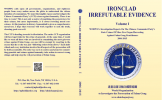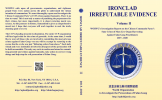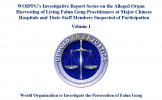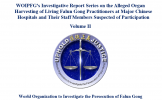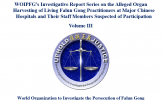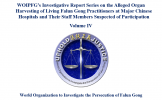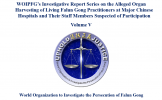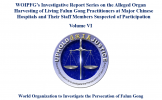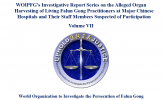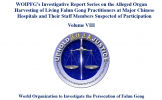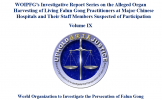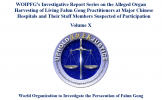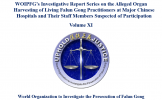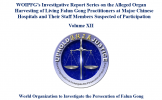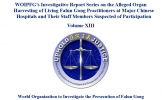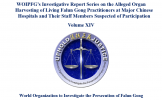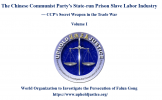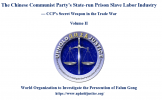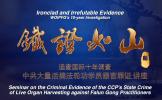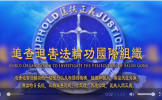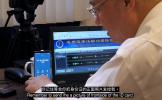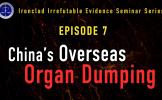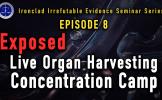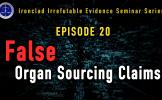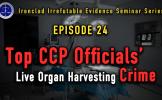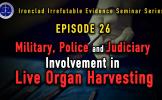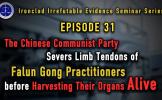Investigative Report on the "610 Office"
Preface
The "610 Office" was established on June 10, 1999 under the direct order of the Chinese Communist Party (CCP) leader Jiang Zemin, who bypassed procedures defined by the Chinese Constitution and laws. The mission of the "610 Office" is to crack down on Falun Gong. Besides its central office in Beijing, the "610 Office" has branch offices in cities, counties, villages, governmental agencies, institutions and schools all over China. From its establishment, structure, reporting hierarchy, to its operational and funding mechanism, the "610 Office" is positioned outside the regime's Party and governmental framework. Therefore, it supersedes the Constitution and has no budgetary constraints. Since the "610 Office" has full control over all issues related to Falun Gong, it has become Jiang Zemin's personal and private tool to persecute Falun Gong. Lacking legal basis, the nature of the "610 Office" is similar to that of Nazi's Gestapo and the "Leadership Group of the Cultural Revolution of Chinese Communist Party (CCP) Central Committee." Because of its special status and function, the "610 Office" should be held responsible for the kidnapping, unlawful detention, monetary fines, killing, beating and torture of Falun Gong practitioners. The World Organization to Investigate the Persecution of Falun Gong (WOIPFG) hereby releases background information of the "610 Office" and a partial list of its crime.
1. The Establishment of the "610 Office"
On April 25, 1999, more than ten thousand Falun Gong practitioners held a peaceful appeal in Beijing. That same evening, Jiang Zemin wrote a letter to the members of the CCP Standing Committee and top leaders. In the letter, Jiang stated for the first time that "the Communist Party must vanquish Falun Gong." The letter reads, "How could it be possible that the Marxism we communists endorse and the materialism and atheism we believe in can't vanquish what Falun Gong propagates? If it were true, wouldn't we become laughing stocks?" [1]
On June 7, Jiang held a meeting among the Politburo members of the CCP to discuss how to swiftly handle and solve the "Falun Gong problem." During his speech, Jiang said "We must take this issue seriously, do more in-depth research, and take effective countermeasures. The Central Leadership has already agreed to let Comrade Li Lanqing form a leadership team with the sole mission of dealing with the 'Falun Gong problem.' Comrade Li Lanqing will be the team lead. Comrades Ding Guangen and Luo Gan will be the assistant team leads. Other comrades who are in charge of relevant departments will be members of the team. They will work together to study the procedures, methods and measures to solve the 'Falun Gong problem.' All the ministries, departments and committees in the Central Party and government, and all the provinces, autonomous regions and municipalities directly under the Central Government must closely cooperate with the team." [2]
Three days later, on June 10, 1999, the CCP Central Committee formed the "Leadership Team Dealing with Falun Gong Issues." Under the leadership of Li Lanqing, Luo Gan and others, the "610 Office" was formed. The "610 Office" was formed before any notices and documents that were issued by the CCP Central Committee and the government. The official crackdown on Falun Gong was marked by the release of several documents around July 20, 1999. These documents include the Announcement of the CCP Central Committee on July 19,[3] the Announcement of the Chinese Ministry of Civil Affairs on July 22,[4] the Announcement of the Chinese Ministry of Public Security on July 22,[5] and the Announcement of the General Administration of Press and Publication on July 22.[6] The earliest announcement was the "Announcement by the CCP Central Committee Forbidding Party Members to Practice Falun Dafa" published on July 19, 1999. In other words, the "610 Office" was formed exactly 40 days prior to the official announcement by the CCP Central Committee to crackdown on Falun Gong.
Traditionally, only the supreme leader of the CCP has the power to bypass normal CCP procedures in order to achieve his personal mission. Throughout the CCP history, there have been a number of such examples including Mao Zedong's "Leadership Group of the Cultural Revolution of CCP Central Committee " in 1966, Deng Xiaoping's "Elders' Democratic Activity Meeting" who forced the resignation of Hu Yaobang, and Deng Xiaoping's Tiananmen Square massacre in 1989.
Based on the traditions of the CCP, the position that Jiang held within the party, the difference in attitude exhibited between Jiang and other members of the Politburo Standing Committee in their public speeches on the issue of Falun Gong, Jiang's letter to the Politburo Standing Committee and other leaders, and his speech at the Politburo meeting, it is easy to reach the conclusion that the formation of the "610 Office" was entirely Jiang Zemin's personal decision.
2. The Structure of the "610 Office"
Under Jiang's direct order, the CCP Central Committee formally created the "Leadership Team Dealing with Falun Gong Issues." Li Lanqing, Ding Guangen and Luo Gan were put in charge of the team, with Li Lanqing as the team lead.[2]
On June 10, 1999, this leadership team formed an office and called it the "610 Office." Wang Maolin[7] and Liu Jing[8] each served as directors of the central "610 Office." The existence of the Central Committee "610 Office" can be validated by the official documents from the Chinese State Council, other Ministries and local governments as well as Chinese media reports.[9, 10, 11, 12, 13]
Following the establishment of the Central "610 Office," each province, city, county and township quickly formed a corresponding organization, and each of them is called "610 Office."[14], [15] After the persecution started on July 20, 1999, the Central "610 Office" became a permanent organization within the CCP, and was elevated to the level of a Ministry. The corresponding regional "610 Offices" were also elevated to the levels of Bureau and Section. The heads of each "610 Office" also received an elevated rank. For example, in Yangquan City, Shanxi Province, the head of the local "610 Office" had the same rank as the head of a county.[16] In the county of Penglai, Shandong Province, the head of the local "610 Office" has the same rank as the director of a Section.[17] In villages and townships, there are "610 Offices" as well.[18]
Universities,[19] government agencies[20] and major corporations[21] also formed "610 Offices." In some official documents, central, provincial and city level "610 Offices" were mentioned at once.[15] The various levels of "610 Offices" were established under the direct order of the CCP Central Committee. The Yunnan Province Simao regional commissioner once said, "Certain organizations outside the original structure, such as the '610 Office,' must be formed because they were required by the CCP Central Committee and the Provincial Committee."[22] In China, the governing power is centralized in the CCP Central Committee. Local governments are not allowed to make their own decisions or to pass their own laws regarding major policies. The Central Committee order is carried out throughout the country with no distinction on how the order is implemented in different regions.
3. Naming and Reporting Relationships of "610 Office"
From the CCP Central Committee to regional CCP committees, there is a corresponding "Leadership Team Dealing with Falun Gong Issues" which manages "the Office of the Leadership Team Dealing with Falun Gong Issues", also called the "610 Office." Most local "610 Offices" are associated with the Political and Law Committee of the local CCP committees. At the beginning, some were associated with the Office of the Communist Party at the local CCP committees. Thus, the "610 Office" belongs to the Communist Party system. Because it is unlawful for the Communist Party to directly handle administrative affairs, the State Council and its governments later formed another office called "the Office of Preventing and Handling Cult Issues." These two offices, one from the Party side, one from the government side, are essentially one entity with two names. To the outside, they still go by "610 Office" and are still controlled by the CCP Political and Law Committee.[23]
4. The Scope of Power of the "610 Office"
On dealing with Falun Gong, the "610 Office" is a super entity. Other than reporting to the local Communist Party committee, it is above the public security, the procuratorate, and the court system. For example, the "610 Office" at the Zhuanglang County, Gansu Province has the following responsibilities: "directing, coordinating and monitoring the entire county's struggle with Falun Gong and other cults" and "directing the the public security agency and state security agency to prevent Falun Gong organizations within and outside China from overthrowing the government, and ensuring the political stability of the society."[24]
Apart from the direct persecution of Falun Gong, [25,26], the "610 Offices" also are involved in the persecuting Falun Gong in other fields, such as, cultural activities,[27] education,[28] cable TV,[29] exhibitions,[12] Qigong,[30] the women's association,[10, 15] the Chinese Communist Youth League,[11] etc. It has the power to select the TV programs broadcasted outside of China.[31] It can interfere with lawyers on cases related to Falun Gong.[32] It also has the power to nominate Party officials. At Datong District, Daqing City, a document clearly states that in order for an official to receive an assignment or a promotion, he must receive the blessings from the Discipline Investigation Committee, the Political and Law Committee, the "610 Office," and others. Otherwise, no further progress will be considered.")[33]
The "610 Office" operates in a clandestine mode. Since 2003, "610 Office" related contents have been deleted from official web pages. An official document from CCP Rongchang County Committee states, "For internal (the documents marked 'secret') purposes, use the name 'CCP Rongchang County Committee Office of the Leadership Team for Dealing with Falun Gong Issues' a.k.a 'County Party Committee 610 Office.' For external (the documents open to the public without secret level) purposes, use the name 'Rongchang County Office of the Leadership Team for Dealing with Falun Gong Issues.' The name of '610 Office' is not allowed externally. In public activities, the use of 'County 610 Office' is absolutely forbidden."[34] According to the CCP tradition, this kind of document can only come directly from the CCP Central Committee.
The Economy and Trade Committee of Suizhou City, Hubei Province received 204 official documents in 2001. Among them, 2 were marked as "announcement," 20 were marked as "secret," and 2 were marked "highly secret." Only one document from the provincial "610 Office" was marked as "top secret" .[35] According to Article 9 of PRC Law on Protection of State Secrets, the state secret has three levels, "secret," "highly secret" and "top secret." "Top secret" is the most important state secret. Leaking it will cause very serious damage to the state safety and interest. The Propaganda Department, Civilization Office, "610 Office" of CCP Central Committee, the Ministry of Public Security, the Ministry of Justice, along with the China Association of Science and Technology jointly released the "Announcement to Hold 'Anti-Cult Pro-Civilization' Exhibition."12 However, none of the CCP controlled media reports on this exhibition mentioned this announcement. Actually, when asked in the State Council Press Conference, the head of the Central "610 Office" Liu Jing intentionally avoided answering a Japanese reporter's question about the "610 Office".[36]
5. Human Resources and Funding of the "610 Office"
The head position of a "610 Office" is normally held by the Deputy Secretary of the Political and Law Committee of the corresponding Communist Party Committee. People who work in the office come from other party and governmental agencies. Currently, certain positions are also open to the public at large as well as new college graduates. For example, in 2003, the Hebei Province "610 Office" hired a student who had just graduated with a master's degree.[37] The Yunnan Province "610 Office" hired 6 college graduates.[38] The Changsha City "610 Office" in Hunan Province hired 2 people from the general public in 2002.[39]
In Penglai City (formerly Penglai County), Shandong Province, there are 7 people in its "610 Office."[17] On top of receiving a salary, each person also receives a so-called "610 compensation" and other job-specific compensations. The Bureau of Human Resources and the Bureau of Finance in Hebei Province jointly released a document called "Notice on Giving Special Bonuses to '610 Office' Employees." The document clearly stated that the bonuses are given based on the decisions from the April 28th National "610 Office" Directors' Conference.[40] In Haizhu District, Guangzhou City, the budget for the Agencies of Public Security, Procuratorate, Court and Justice was 158 Million Chinese Yuan in 2002, an increase of 27 Million Chinese Yuan over 2001 or 21.29%. The main reason for the increase is to pay the salaries and special bonuses as well as the funding for the "610 Office."[41] Raohe County, Heilongjiang Province reported a one-time spending for "610 Office" supplies.[42] Guangzhou City converted the Conghua Hot Spring Convalesce Center for police officials to the work place of the "610 Office" of the City Public Security Bureau.[43]
6. The "610 Office" Is An Illegitimate Entity
The State Council issued "The Notification on the Structure of the Government" (State Council [2003] number 8) on March 21, 2003. It states that the "State Council Office of Preventing and Handling Cult Issues" and the "CCP Central Committee Office of Leadership Team for Dealing with Falun Gong Issues" are the same organization with two different public names. It is directly controlled and run by the CCP Central Committee.[44] The government at all levels have the corresponding "Office of Preventing and Handling Cult Issues." Those government offices actually are the same offices of the CCP's "610 Offices" and are controlled by the Political and Law Committee of the CCP local committees.[23]
The "State Council Office of Preventing and Handling Cult Issues" was established in September 2000,[36] more than one year after the establishment of the CCP Central Committee "610 Office." The first report of this office appeared on Feb. 26, 2001. On that day, this office co-organized an "Anti Falun Gong Advanced Performances Conference" with the Central Oganization Department, the Central Propaganda Department, The Political and Law Committee of the CCP Central Committee, Ministry of Public Security, Ministry of Civil Affairs and Ministry of Personnel of PRC (State Council). Another report on this office was about the Press Office of the State Council held a press conference on Feb. 27, 2001.[36]
This organization is not well known to the public. The major event it organized was the "Anti-Cult Pro-Civilization" exhibition in July 2001.12, [45] Wang Xiaoxiang, the deputy director of this office, attended "The Beijing Anti Falun Gong Working Conference" on Jan. 9, 2003.[46] "The Notification on the Structure of the Government" (State Council [2003] number 8), issued by the State Council on March 21, 2003 mentioned this organization.44 This means that the State Council "Office of Preventing and Handling Cult Issues" (the government version of "610 Office") had been active from September 2000 to March 2003. However, the CCP authorized propaganda media People's Net database, which was updated in April 2003, includes neither the State Council "Office of Preventing and Handling Cult Issues," nor the CCP Central Committee "Office of Leadership Team for Dealing with Falun Gong Issues" on the State Council's list[47] and the Central CCP's list.[48] There are only two subcommittees that can be related to Luo Gan on the CCP Central Committee's direct controlled subcommittees. They are "Political and Law Committee of the CCP Central Committee" and "Central Committee of Comprehensive Management of Public Security." Both of these are headed by Luo Gan. Luo Gan's personal information referencing these two subcommittees was updated on Nov. 15, 2002. Since the "610 Office" which has two other public names, was very active at that time, but both names couldn't be found on any of the CCP Central Committee and State Council's list, it can be considered a secret and illegal organization.
The establishment of the Central and sub-level "610 Offices" is against the Article 36 of Chinese Constitution. Article 89 of the Constitution defines the State Council's functions and powers, which includes (1) to adopt administrative measures, enact administrative rules and regulations and issue decisions and orders in accordance with the Constitution and the law; and (2) to direct and administer civil affairs, public security, judicial administration, supervision and other related matters.
The National People's Congress, which is the highest body of the People's Republic of China, did not endorse the establishment of "610 Office." The State Council did not nominate the formation of the "610 Office." The Constitution and the Organic Law of the State Council of the PRC have not given the Party the right to interfere with administrative and governmental matters. Therefore, it is illegal for the CCP Central Committee to control the "Office of Preventing and Handling Cult Issues."
It is illegal for the "610 Office" to control the public security and judicial system according to Articles 126, 128, 131 and 133 of the Constitution. According to the above Articles, the People's Court and the People's Procuratorate have independent rights to exercise jurisdiction and prosecutorial powers.
Updates (Feb. 1, 2011)
Since its establishment on June 10, 1999, the CCP Central Committee "610 Office" has been in charge of all aspects of the persecution of Falun Gong. During the last 11 years, it has gone through many changes, including its public names. Despite of all changes, the "610 Office" has always been operating independently. The name of the "610 Office" has been kept unchanged. Despite a few basic unit "610 Offices" were merged with other offices, most provincial, city and regional "610 Offices" maintain their own identity, separated from the strengthened and expanded "Office of Maintaining Social Stability" and "Office of Comprehensive Management of Public Security."
This update mainly includes members of the CCP Central Committee "610 Office." In recent years, the Party Committee leadership teams For Handling Falun Gong Issues and its "610 Offices" have combined the "(Office of) Leadership Team for Handling Falun Gong Issues" of CCP Committee and the "Office of Preventing and Handling Cult Issues" of the government into "(Office of) Leadership Team for Preventing and Handling Cult Issues" of the CCP Committee. Internally and also in some public documents, the name "610 Office" continues to be used.
CCP Central Committee Leadership Team for Dealing with Falun Gong Issues
June 1999 to Nov. 2001: Team Lead: Li Lanqing Assistant Lead: Ding Guangen, Luo Gan Members: Wang Maolin (until Sept. 2001), Liu Jing (Starting from June 1999)
Nov. 2001 to Oct. 2007: Team Lead: Luo Gan (Secretary of CCP Central Political and Law Committee) Assistant Lead: Zhou Yongkang (Deputy Secretary of CCP Central Political and Law Committee, Minister of Public Security) Members: Liu Jing (Director of CCP Central 610 Office, Deputy Minister of Public Security)
Oct. 2007 to Present: Team Leader: Zhou Yongkang (Secretary of CCP Central Political and Law Committee) Assistant Leader: Wang Lequan (Started in April 2010), Meng Jianzhu (Minister of Public Security) Members: Wang Shengjun (President of the Supreme People's Court), Cao Jianming (Attorney General of the Supreme People's Procuratorate), Zhou Benshun (Secretary General of CCP Central Political and Law Committee), Chen Jiping (Deputy Director of the Central Committee for Comprehensive Management of Public Security, Deputy Secretary-General of CCP Central Political and Law Committee, Director of the Office of Comprehensive Management of Public Security), Liu Jing (until Oct. 2009), Li Dongsheng (started in Oct. 2009)
The Office for Dealing with Falun Gong Issues of CCP Central Committee (Central "610 Office")
Director:
Wang Maolin (June 1999 to Sept. 2001), also then Deputy Director of the Leadership Team of Central Propaganda
Liu Jing (Sept. 2001 to Oct. 2009), also Deputy Minister of Public Security and Deputy Secretary of CCP Committee of Ministry of Public Security
Li Dongsheng (Started in Oct. 2009. He was also the Deputy Director of the Department of Propaganda of CCP Central Committee. Since June 1999, he was the Deputy Director of the Central "610 Office", mainly in charge of anti Falun Gong propaganda. He was named member of the Party Committee in the Ministry of Public Security in order to become the Director of the Central "610 Office.")
Deputy Director:
Liu Jing (June 1999 to Sept. 2001)
Gao Yichen (Started in 2005 as the Executive Deputy Director of the Central "610 Office". Born in 1950. Former Deputy Minister of the State Security. Vice Secretary-General of the Central Political and Law Committee, Deputy Diector of the Central Office for the Leadership Team of Maintaining Stability, Deputy Director of Central "610 Office" since end of 2005.)
Yuan Yin (2001 to Feb. 2006)
Xu Haibin (Started in 2007; Graduated from Chinese Literature Department of Shandong University in 1978; Luo Gan’s secretary in CCP Central Political and Law Committee)
Wang Xiaoxiang (Started in 1999; Secretary of the Office of Work Committee of Central Government Departments, Chairman of the Youth Committee of Central Government Departments.)
Liu Zhenhua (Started in Jan. 2004)
Current and Former Members of the Central "610 Office" ranked as Bureau level officials
Bureau of Secretary
Director: Wang Tixian, former standing member of the Central Committee of Chinese Communist Youth League (CCYL), president of the Youth Work Department of the CCYL Central Committee. From Nanjiang county, Sichuan Province.
Bureau One
Deputy Director: Li Xiaodong
Director: Li Yanhua
Bureau Two (a.k.a. Bureau of Education and Transformation)
Director: Shao hongwei
Deputy Director: Gao Xiaodong (female)
Note: former Secretary of the Committee of Policy Research Office of Hunan Province, Wang Maolin’s secretary Fan Xuyin might be the Director of Bureau Two for a period of time.
Bureau Three:
Director: Fu Huimin (female) Appointed Deputy Mayor of Baicheng City, Jilin Province in 2007.
Deputy Secretary of Party Committee: Yang Dianli
Vice Inspector: Song Quanzhong, Chen Zhongmin
References
[1] Beijing Spring 2001(6): A letter to the standing members of the Politburo and other top leaders by Jiang XX. (April 25, 1999)(Back)
[2] Beijing Spring 2001(6): A speech at the meeting of the CCP Politburo on how to swiftly handle and solve the "Falun Gong problem." by Jiang XX. (June 7, 1999)(Back)
[3] An announcement by the CCP Central Committee Forbidding Party Members from practicing Falun Gong (July 19, 1999)(Back)
[4] The Decision by the Ministry of Civil Affairs of the People's Republic of China (PRC) about banning the Falun Dafa Research Society.(Back)
[5] An announcement by the Ministry of Public Security of PRC.(Back)
[6] An announcement by the Press and Publication Bureau of PRC reiterating the processing opinion about the publication of Falun Gong Literature.(Back)
[7] Changchun city green-garden district spring city subdistrict office: Guided by the policy of "four politics" and diligently do practical work for the people.(Back)
[8] Creaders.net: January 16, 2003] The Director of Central 610 Office Liu Jing takes the post of vice-minister of the Ministry of Public Security.(Back)
[9] 2002 Work Report of the health improving qigong administrative center of the National Sports Bureau.(Back)
[10] Hua Fuzhou’s work report on the seventh conference of the coordination group of the national five-good civilized family establishment activity.(Back)
[11] Internal Briefing of the Communist Youth League central committee (2001).(Back)
[12] Report on the exhibition of "Oppose Cults and Advocate Science" held in Ningxia province; Report on the large-scale Photo exhibition of "Oppose Cults and Advocate Science" held in Chengdu city.(Back)
[13] Documents of big event records of Hangzhou Caihe Street Commity and the report.(Back)
[14] Guangdong Provincial Party Committee Appointment Name List(Back)
[15] The 40th Issue of the Jinan Women's Union and Women’s Work Communication(Back)
[16] Scheme of the Function Disposition, inside organization and personnel organization of Shanxi Province Yangquan City Party Committee General Office of the CCP(Back)
[17] 2001 Penglai Chronicle(Back)
[18] Organization Setup of Beijing Haidian District East Beiwang Township)(Back)
[19] The report of the Public Security Devision of China Ocean University; Management Organization Setup of Shandong University; The 304th Issue of the Weekly Information of the Party Committee and Principal Office of Lanzhou University(Back)
[20] The administration function of the Political Department of Guangzhou Bureau of Justice.(Back)
[21] The structure of the "615 office" of Heilongjiang Daqing Petroleum Administration Bureau.(Back)
[22] Yunnan Simao Prefecture Party Secretary's Speech at the 2001 Prefecture County Township Organization Reform Mobilization Conference.(Back)
[23] Stipulates on the Function Configuration, Inside Setup and Staff of the Political and Judiciary Committee of Beijing Congwen District of the CCP. b) 2001 Penglai City Chronicle; c) The CCP Zhaoqing City Committee Office Document (the 13 Issue in 2001 by Zhaoqing City Party Committee Office)(Back)
[24] Responsibilities of the Political and Judiciary Committee and "610 office" of Zhuanglang County of Gansu Province.(Back)
[25] The Urgent Notice of Strengthening the Monitoring of Work During Sensitive Periods (such as "4]25") by the CCP Mentougou District Party Committee "610 office."(Back)
[26] The Urgent Notice of Firmly Striking out Falun Gong Anti-propaganda Activities From the "610 Office" of the CCP Mentougou District Committee. the 30th issue of Mentougou 610 (2001)(Back)
[27] Notice of Organizing and Watching the Modern Music Drama "The Unusual Mother and Daughter by the Changzhou City Party Committee Propaganda Department and the City Party Committee "610 office" (the 19th Issue in 2002 by Changzhou City Party Committee "610 Office").(Back)
[28] Notice of Continuing the Anti-cults Education in Middle and Elementary Schools by the Ministry of Education (the 3rd Issue in 2003 by the Teaching-Society-Politics) (The copies of this document are sent to: Central Committee "610 Office," Ministry of Public Security).(Back)
[29] Notice of Approving and Transmitting by Zhangjiagang City Party Committee Office (the 6th Issue in 2003) "Opinion on Further Standardizing the Construction of Wired Television System in Newly Built Residence Villages and Buildings" Proposed by the City Party Committee "610 Office", City Construction Bureau and City Culture Bureau.(Back)
[30] 2003 Main Work Report of National Sports Bureau Health-improving Qigong Center.(Back)
[31] 2000 CCTV Chronicle (on May 26th, 2002)(Back)
[32] Reports on Chongqing Lawyer Work (12th issue of 2001)(Back)
[33] Report titled "Create Mechanism of Cardre Selection and Assignment, Improve the Art of Cardre Selection and Assignment" by Wang Rui from the CCP Daqing City Datong District Standing Committee and the Organization Department.(Back)
[34] Inside-setup of the Political and Judiciary Committee of the CCP Rongchang County Committee(Back)
[35] Related Important Documents received in 2001 by the Economic and Trade Committee of Suizou, Hubei province(Back)
[36] Liu Jing’s Answer to Reporters at the Press Conference by the Information Office of the State Council (on February 27th, 2001)(Back)
[37] Hebei Province’s Announcement of Recuiting Government Servant (Staff) from This Year’s Graduates of Institutions of Higher Education (2003)(Back)
[38] Admit Plan of Examing and Hiring Government Servants in Yunnan Province (2003)(Back)
[39] General Rules of Examing and Hiring Government Servants and Organization Staff through Unified Examination by Changsha City Party Government-Public Organizations (2002)(Back)
[40] "Notice of Implementing Allowance for the Staff of 610 Office" (the 13th Issue, 2003, Hebei province)(Back)
[41] Year 2002 Finance Budget of the Guangzhou Haizhu District(Back)
[42] Report on the Purchase of Concrete Office Equipment of Heilongjiang Raohe County.(Back)
[43] Document of the CCP Guangzhou City Party Committee Office (the 21st Issue of 2002)(Back)
[44] State Council’s Notice on the Organization Establishment (the 8th issue of 2003 by the State Council)(Back)
[45] Large Scale Exhibition "Opposing Cults, Advocating Civilization" Starts in Beijing (People's Net, July 15, 2001)(Back)
[46] Beijing Work Conference on the Struggle against "Falun Gong" (Beijing Daily, January 10, 2003)(Back)
[47] Leader Name List of the administrative office and the subordinate organization of the State Council and Every Ministry.(Back)
[48] Central Committee of the CCP Subordinate Organizations(Back)
Note 1: In China, Central leadership has very specific meaning, that is Central Committee of the Chinese Communist Party, not the government.
Note 2: Documentation is available for every reference listed above. If you need a copy, please contact "World Organization to Investigate the Persecution of Falun Gong."
World Organization to Investigate the Persecution of Falun Gong
Tel:1-347-448-5790;Fax:1-347-402-1444;
Mail Address:P.O. Box 84, New york, NY 10116
Website: http://www.upholdjustice.org/, http://www.zhuichaguoji.org/


